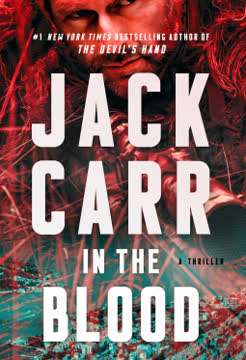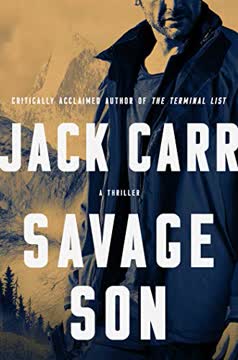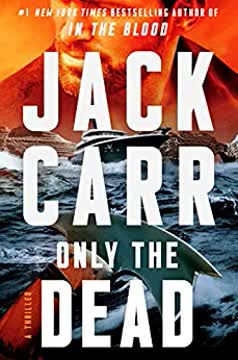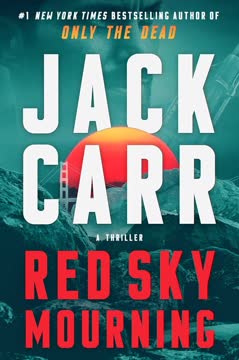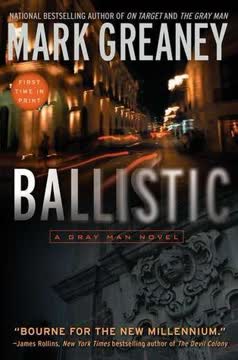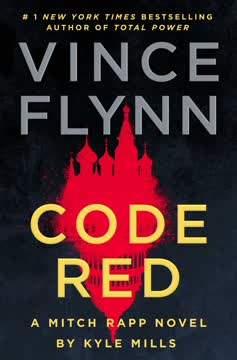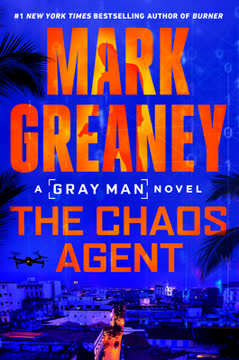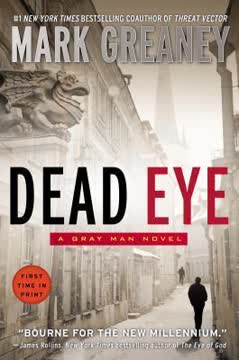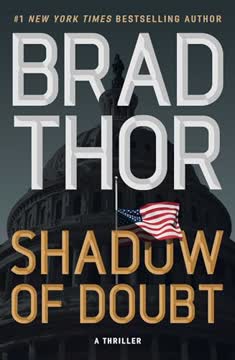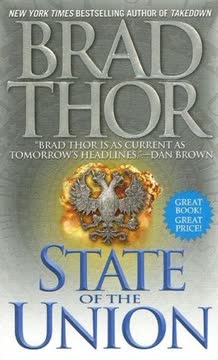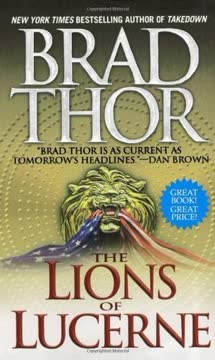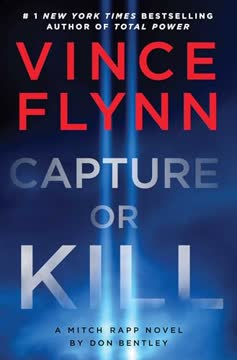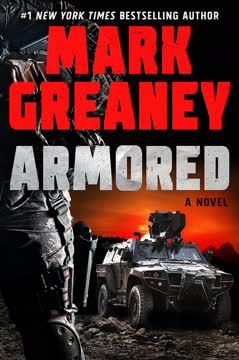Plot Summary
Death in the Shadows
Aliya Galin, a seasoned Mossad assassin, completes a targeted killing in Africa, only to be killed herself when her plane is shot down by surface-to-air missiles. The attack is orchestrated by Nizar Kattan, a Syrian sniper, and his French accomplice, Le Drian, under the direction of shadowy Russian interests. The event is not just an act of terror but a message, and it draws the attention of James Reece, a former Navy SEAL and CIA operative, who once shared a deep, complicated bond with Aliya. Her death is the spark that reignites Reece's own war, setting him on a path of vengeance and self-discovery.
The Hunter's Dilemma
James Reece, living in Montana and trying to find peace, is pulled back into the world of covert operations by Aliya's death. He is haunted by the dichotomy of his nature: a man capable of extreme violence, yet yearning for meaning and forgiveness. The attack on the plane is personal—Aliya was more than a colleague; she was a mirror to his own soul. Reece's journey is not just about hunting her killers, but about confronting the darkness within himself and questioning the cost of endless war.
Ghosts of Baghdad
Flashbacks reveal Reece and Aliya's relationship in Baghdad during the Iraq War. Both outsiders—he a SEAL attached to the CIA, she a Mossad operative under deep cover—they form a bond forged in violence and secrecy. Their connection is professional, but tinged with unspoken longing and mutual respect. When Aliya is wounded in a bombing, Reece saves her, and she confesses her true identity. This history shapes Reece's resolve to avenge her, and underscores the personal stakes of his mission.
The Assassin's Message
As Reece investigates, he uncovers a web of international intrigue. Russian intelligence, through the SVR and FSB, is orchestrating events from the shadows, using proxies like Kattan and Le Drian to eliminate threats and sow chaos. The Mossad, CIA, and other agencies are all entangled, each with their own agendas. Reece learns that Aliya's death was not random, but part of a larger plot to draw him out and settle old scores. The lines between hunter and hunted blur as Reece becomes both predator and prey.
Forgiveness and Fury
Reece's quest takes him from Montana to Arlington, where he reflects on the meaning of sacrifice and the legacy of violence. Conversations with Caroline Hastings, a matriarch who has survived her own wars, force Reece to confront the corrosive power of hate and the possibility of forgiveness. He is reminded that vengeance, while powerful, can consume the soul and leave nothing but ashes. Yet, the promise he made to the families of the fallen compels him forward.
The Sniper's Trap
Reece tracks Kattan and Le Drian to Montenegro, where a sniper's duel is set. Both men are masters of their craft, each anticipating the other's moves. The landscape is treacherous, the stakes are life and death, and the outcome is uncertain. Reece must outthink and outmaneuver his adversaries, knowing that a single mistake means death. The confrontation is not just physical, but psychological—a test of will, patience, and the lessons learned from a lifetime of war.
Quantum Eyes
Reece is introduced to "Alice," a quantum AI developed by the U.S. government, capable of sifting through global data in real time. Alice becomes his silent partner, tracking digital footprints, predicting moves, and revealing the hidden hands behind the conspiracy. The rise of AI surveillance is both a tool and a threat, raising questions about privacy, power, and the future of warfare. The digital and physical worlds collide as Reece navigates a landscape where nothing is truly secret.
The Bookman's Secret
In Italy, Reece seeks out Saul Abelard, a former Mossad assassin turned rare book dealer, now confined to a wheelchair. Abelard is a broker in the clandestine world, connecting killers, spies, and mercenaries. He helps Reece piece together the plot, revealing that the Russians are using terror as a smokescreen for targeted assassinations. Together, they survive a brutal attack by a Russian-directed terror cell, and Abelard's own quest for closure becomes entwined with Reece's.
Blood in the Mountains
The pursuit culminates in the mountains of Montenegro, where Reece and Kattan face off in a sniper's duel. Both have set traps, both are prepared for contingencies, but Reece's adaptability and refusal to play by the expected rules give him the edge. He kills Le Drian and finally confronts Kattan, fulfilling his promise to avenge Freddy Strain and Aliya. In the end, Reece chooses not just vengeance, but a measure of forgiveness, breaking the cycle of hate that has defined his life.
The Russian Web
Behind the violence lies a deeper conspiracy. Russian intelligence, led by Gromyko and Dashkov, has been manipulating events to eliminate threats and destabilize the West. Their use of proxies, disinformation, and cyberwarfare is a new kind of conflict—one where truth is elusive and alliances are fluid. The Russians' ultimate goal is to protect a secret "list" created by Reece's father, a former CIA officer, which could expose decades of espionage and corruption. The past and present collide as Reece uncovers the true stakes of his mission.
The Wheelchair and the Hawk
Abelard, seeking his own justice, joins Reece in Moscow for a final confrontation with Gromyko. Together, they outmaneuver Russian surveillance and assassinate the SVR director, avenging old wounds and closing a chapter of Cold War history. Abelard's journey from assassin to bookseller to avenger mirrors Reece's own struggle to adapt and find purpose beyond violence. Both men are forced to reckon with the cost of their choices and the possibility of redemption.
The List and the Key
Reece learns that his father left behind a key to a safe-deposit box containing a list of deep-cover Russian agents in the West. The existence of the list is the real reason for the Russian vendetta against the Reece family. The knowledge is both a burden and a weapon, one that could change the balance of power but also destroy lives. Reece must decide whether to pursue the truth or let some secrets die with the past.
Avalanche at Home
Just as Reece contemplates a new life with Katie, news breaks of the U.S. president's assassination. Federal agents descend on Reece's Montana home, arresting him for conspiracy. The cycle of violence and suspicion has followed him home, threatening everything he loves. The story ends on a cliffhanger, with Reece's fate uncertain and the shadow of the past still looming.
The Final Contingency
Throughout the narrative, every character is forced to confront the reality that in the world of espionage and covert war, there is always another contingency, another player, another secret. The lines between friend and foe, hunter and hunted, are constantly shifting. The only constant is the need to adapt, to survive, and to find meaning in a world defined by betrayal and loss.
The Price of Vengeance
Reece's journey is a meditation on the cost of vengeance—not just to the target, but to the avenger. Every act of violence leaves scars, and the pursuit of justice can become indistinguishable from the pursuit of destruction. The novel asks whether it is possible to break free from the cycle, to forgive, and to build something new from the ruins.
The Power of Adaptation
In the end, Reece is offered a chance at a new beginning—a life beyond the gun, with love, purpose, and peace. The lesson is that survival is not just about killing, but about adapting, forgiving, and choosing to live. The story closes with the hope that even those forged in blood can find redemption, if they are willing to let go of the past.
Characters
James Reece
Reece is a former Navy SEAL and CIA operative, defined by his capacity for violence and his relentless pursuit of justice for those he loves. He is deeply scarred by loss—his wife, daughter, friends, and comrades—and struggles with the dichotomy of being both protector and destroyer. His journey in this novel is as much internal as external: he must confront the darkness within, question the morality of vengeance, and ultimately seek forgiveness for himself and others. His relationships—with Aliya, Katie, and the Hastings family—anchor him, but he is always at risk of being consumed by the wars he cannot leave behind.
Aliya Galin
Aliya is a Mossad operative whose life is defined by violence, sacrifice, and the pain of losing her family to terror. Her relationship with Reece is one of mutual recognition—both are outsiders, both are killers, both long for something more. Her death is the catalyst for the novel's events, and her legacy is the question of whether it is possible to serve a cause without losing oneself. Aliya embodies the cost of endless war and the longing for normalcy that is always just out of reach.
Nizar Kattan
Kattan is a Syrian sniper, a mercenary shaped by war, betrayal, and a rejection of ideology. He is a mirror to Reece—skilled, patient, and ruthless, but also searching for meaning beyond the gun. Kattan's motivations are pragmatic rather than ideological; he is a survivor, using violence as a means to escape his past. His duel with Reece is both a test of skill and a confrontation between two men who understand each other's darkness.
Saul Abelard
Once a Mossad assassin, now a rare book dealer in a wheelchair, Abelard is a man defined by adaptation. His injury and exile have not dulled his mind or his thirst for justice. Abelard operates in the shadows, connecting killers and spies, but is ultimately seeking closure for his own wounds. His partnership with Reece is one of mutual respect and shared purpose, and his final act of vengeance against Gromyko is both personal and symbolic—a reckoning with the ghosts of the past.
Jean-Pierre Le Drian
A former French Foreign Legionnaire, Le Drian is a soldier of fortune, motivated by money and the thrill of the hunt. He is skilled but ultimately expendable, caught between greater powers and his own ambitions. His fate at Reece's hands is a reminder that in the world of covert war, loyalty is fleeting and death is always close.
Mikhail Gromyko
The director of Russia's SVR, Gromyko is a relic of the Cold War, driven by paranoia, ambition, and a belief in the necessity of ruthless action. He is the architect of the plot against Reece, motivated by the need to protect secrets that could unravel decades of espionage. Gromyko's death at the hands of Abelard and Reece is both personal and political—a settling of old scores and a symbol of the end of an era.
Katie Buranek
An investigative journalist and Reece's partner, Katie represents the possibility of life beyond violence. She is intelligent, courageous, and unwilling to be a bystander. Her relationship with Reece is tested by the dangers that follow him, but she is also his reason to hope for redemption and a new beginning.
Caroline Hastings
Caroline is a survivor of her own wars, both literal and emotional. She counsels Reece on the power of forgiveness and the dangers of letting hate define one's life. Her perspective is hard-won, and her role is to remind Reece—and the reader—that survival is not just about killing, but about healing and returning to those who love you.
Victor Rodriguez
As Reece's handler and ally, Rodriguez is a bridge between the world of official power and the shadow world Reece inhabits. He is both supportive and wary, understanding the necessity of men like Reece but also the dangers they pose. Rodriguez's role is to facilitate Reece's mission while trying to keep him—and the country—out of the abyss.
Alice (AI)
Alice is a quantum AI, a product of the new age of surveillance and cyberwarfare. She is both tool and character, capable of seeing everything and predicting outcomes. Alice's presence raises questions about privacy, control, and the future of intelligence. She is a silent partner to Reece, but also a reminder that in the modern world, nothing is truly hidden.
Plot Devices
Duality of Hunter and Hunted
The novel's structure is built around the shifting roles of hunter and hunted. Reece, Kattan, and others are constantly switching between these positions, forcing the reader to question who truly has the advantage. This device heightens tension and underscores the psychological complexity of the characters, who are never just one thing.
Flashbacks and Parallel Narratives
The use of flashbacks—to Baghdad, to past missions, to formative traumas—serves to deepen the characters and provide context for their actions. These parallel narratives allow the reader to see how the past shapes the present, and how old wounds drive current choices.
Foreshadowing and Misdirection
The novel is rife with foreshadowing—hints of betrayals, warnings of traps, and the ever-present threat of unseen enemies. Misdirection is used to great effect, both in the plot (as with the sniper duel) and in the larger conspiracy, where nothing is as it seems and every ally could be a foe.
The List and the Key
The safe-deposit box key and the mysterious list left by Reece's father are classic MacGuffins—objects that drive the plot and motivate the characters. But unlike many such devices, the list has genuine consequences: it represents the hidden history of espionage, the cost of secrets, and the reason for the vendetta against the Reece family.
AI Surveillance and Quantum Computing
The introduction of Alice, the quantum AI, is both a plot device and a thematic statement. It allows for rapid information gathering, global reach, and the exposure of hidden connections. But it also raises ethical questions about the nature of power, the loss of privacy, and the dangers of unchecked technological advancement.
The Cycle of Violence and Forgiveness
The novel repeatedly returns to the question of whether vengeance can ever bring peace, and whether forgiveness is possible for those who have lived by the sword. Characters like Caroline and Abelard embody the wisdom of survival, while Reece's journey is about learning to let go of hate and choose life.
Analysis
In the Blood is a high-octane, globe-trotting thriller that uses the conventions of the genre—snipers, assassins, conspiracies, and betrayals—to explore deeper questions about violence, trauma, and the possibility of redemption. Jack Carr's narrative is both a love letter to the traditions of the military thriller and a critique of the endless cycles of war and revenge that define its heroes. The novel's modern elements—AI surveillance, cyberwarfare, and the blurring of state and non-state actors—reflect the realities of contemporary conflict, where the battlefield is everywhere and nowhere. At its heart, the story is about the cost of vengeance: the way it consumes not just the target, but the avenger; the way it perpetuates loss and prevents healing. Through Reece's journey, Carr suggests that true strength lies not in the ability to kill, but in the courage to forgive, adapt, and choose life after war. The final, unresolved note—Reece's arrest and the looming secrets of the past—reminds us that in the world of espionage, there are always more shadows, more secrets, and more battles to fight.
Last updated:
FAQ
Synopsis & Basic Details
What is In the Blood about?
- A Global Manhunt Unfolds: In the Blood follows former Navy SEAL James Reece as he is drawn back into the clandestine world after the assassination of Aliya Galin, a Mossad operative with whom he shared a complex past. Her death, orchestrated by Syrian sniper Nizar Kattan and his French accomplice, is revealed to be part of a larger, shadowy Russian conspiracy.
- A Quest for Vengeance and Truth: Reece embarks on a relentless international pursuit, from the mountains of Montana to the battle-scarred landscapes of Africa, the ancient streets of Israel, and the hidden corners of Europe. His mission is not just to avenge Aliya and his fallen comrade Freddy Strain, but to uncover the true puppet masters behind the attacks.
- Confronting Personal and Geopolitical Demons: As Reece navigates a world of shifting alliances and advanced surveillance, he confronts his own internal struggles with vengeance, forgiveness, and the enduring cost of war. The narrative delves into the psychological toll of his past, while simultaneously exposing a deep-seated Russian plot tied to a secret from his father's CIA career.
Why should I read In the Blood?
- Masterful Blend of Action & Intrigue: Jack Carr delivers a high-octane thriller packed with meticulously researched combat sequences and a complex geopolitical plot, offering a visceral reading experience for fans of military fiction and spy thrillers. The detailed descriptions of weaponry, tactics, and clandestine operations immerse readers in Reece's dangerous world.
- Deep Dive into Character Psychology: Beyond the explosive action, the novel offers a compelling psychological exploration of James Reece, delving into his internal conflicts, his struggle with trauma, and his search for meaning beyond violence. Readers witness his evolution as he grapples with the corrosive nature of vengeance and the elusive path to peace.
- Timely Exploration of Modern Warfare: The book integrates cutting-edge themes like quantum computing, AI surveillance, and information warfare, providing a chillingly plausible glimpse into the future of intelligence and conflict. It challenges readers to consider the ethical implications of pervasive surveillance and the blurred lines of modern espionage.
What is the background of In the Blood?
- Echoes of Cold War Espionage: The narrative is deeply rooted in the historical context of Cold War intelligence operations, particularly the long-standing rivalry between the U.S. (CIA) and Russia (KGB/SVR/GRU). References to events like the Munich Massacre (1972), the Soviet-Afghan War (1979-1989), and the Church Hearings (1975) provide a rich historical backdrop for the contemporary plot.
- Technological Frontier of Surveillance: The book extensively explores the cutting edge of surveillance technology, including quantum computing and AI (Alice), drawing on real-world concepts like the NSA Utah Data Center and the Internet of Things (IOT). This technological backdrop highlights the erosion of privacy and the immense power wielded by those who control data.
- Geopolitical Chessboard of Conflict: The story spans diverse geographical and cultural landscapes—from the rugged mountains of Montana and Montenegro to the bustling cities of Baghdad, Tel Aviv, and Turin, and the vast savannas of Burkina Faso. Each location is intricately woven into the plot, reflecting ongoing global conflicts, regional tensions, and the complex interplay of state and non-state actors.
What are the most memorable quotes in In the Blood?
- "For the wages of sin is death.": This epigraph from Romans 6:23, placed prominently after the dedication, immediately sets a somber, thematic tone for the novel, foreshadowing the pervasive violence and the ultimate cost of the characters' actions and choices. It underscores the moral weight of the narrative and the inevitability of consequences.
- "There is power in forgiveness, Reece.": Uttered by Caroline Hastings, this recurring admonition serves as a central thematic counterpoint to Reece's relentless pursuit of vengeance. It highlights the novel's exploration of healing and breaking the cycle of violence, offering a path to peace that transcends mere retribution.
- "Fast is fine, but accuracy is final. In a gunfight you must learn to be slow in a hurry.": This quote, attributed to Wyatt Earp and recalled by Reece during a critical firefight, encapsulates the disciplined, methodical approach to combat that defines Reece as a sniper and operator. It symbolizes the mental fortitude and precision required to survive in a chaotic world.
What writing style, narrative choices, and literary techniques does Jack Carr use?
- Immersive First-Person Perspective: While primarily a third-person limited narrative focusing on James Reece, Carr often shifts into Reece's internal monologue, providing direct access to his thoughts, tactical assessments, and emotional turmoil. This technique creates a deep sense of immersion, allowing readers to experience the world through the eyes of a highly trained operator.
- Detailed Procedural Realism: Carr's writing is characterized by an almost encyclopedic level of detail regarding military hardware, combat tactics, and intelligence tradecraft. This procedural realism, stemming from his own SEAL background, lends authenticity to the action sequences and covert operations, appealing to readers who appreciate technical accuracy.
- Symbolism and Thematic Repetition: The novel employs recurring symbols and motifs, such as the Rolex watch (representing time and legacy), the concept of "home" (both physical and emotional), and the constant interplay of light and shadow. Thematic repetition, particularly around vengeance, forgiveness, and adaptation, reinforces the core messages and Reece's internal journey.
Hidden Details & Subtle Connections
What are some minor details that add significant meaning?
- The Rolex Submariner's Journey: Reece's father's Rolex, passed down through generations and reclaimed from Oliver Grey, is more than a watch; it's a tangible link to his family's legacy of service and sacrifice. Its constant presence on Reece's wrist, often noted in moments of reflection, symbolizes the weight of his past and the relentless march of time, connecting him to his father's admonitions about living in the present.
- Abelard's Book Restoration Metaphor: Saul Abelard's meticulous work in restoring rare books, particularly those damaged by "heat, dust, and insects," subtly mirrors his own life and the lives of characters like Reece. It symbolizes the attempt to repair and preserve what is broken by the harsh realities of the world, suggesting that even shattered lives can find a form of restoration or purpose.
- The "Green on Blue" Attack in Africa: The seemingly random attack by a Burkina Faso operator on Reece's helicopter is a chilling detail that foreshadows the deeper Russian conspiracy. It highlights the insidious nature of modern warfare, where enemies can be embedded within allied forces, and even trusted partners can be compromised, making every interaction a potential threat.
What are some subtle foreshadowing and callbacks?
- Caroline Hastings's Warning on Hate: Caroline's poignant story of her brother Jonathan's post-war bitterness and her plea for Reece to "forgive" and "truly come back" subtly foreshadows the internal battle Reece faces throughout the novel. Her wisdom serves as a constant callback to the destructive nature of unchecked vengeance, culminating in Reece's eventual act of forgiveness towards Nizar.
- The "Bullet That Kills You" Preface: Jack Carr's preface, discussing the speed of a bullet and the psychological impact of a sniper, subtly foreshadows the climactic sniper duel between Reece and Kattan. It sets the stage for a thinking man's game, where the differentiator is not just marksmanship but strategic cunning and the ability to outmaneuver an adversary.
- Alice's "Through the Looking Glass" Message: Alice's cryptic text, "You are through the looking glass now," is a direct callback to Lewis Carroll's sequel, hinting at a world where everything is reversed and reality is distorted. This foreshadows the profound revelations about the true nature of the Russian conspiracy and the unexpected betrayal that awaits Reece at the novel's end.
What are some unexpected character connections?
- Abelard's Link to Gromyko: The revelation that Abelard's paralysis was caused by a KGB sniper in Berlin in 1986, and that the sniper was Mikhail Gromyko, creates a deeply personal and unexpected connection between the Mossad bookseller and the SVR director. This hidden history transforms Abelard's character from a mere information broker into a direct avenger, adding a profound layer of personal vendetta to the geopolitical plot.
- Oleg Berzin's GRU Past and New Life: The Russian assassin Oleg Berzin, initially presented as a ruthless operative, is unexpectedly humanized by his new family in Italy and his desire to leave his violent past behind. His connection to the Soviet-Afghan War and his eventual "atonement" through his boxing gym offer a surprising parallel to Reece's own yearning for peace, highlighting the universal desire for a life beyond conflict.
- Tuvia Yatom's Family Ties to Aliya: Tuvia, the one-eyed Shin Bet liaison, is not just a professional contact but a deeply personal connection to Aliya Galin, having been a close friend and comrade of her deceased husband, Yonatan. His role as a "godfather" figure to Aliya's children adds an emotional weight to the Israeli segment of the story, underscoring the intergenerational impact of conflict on families.
Who are the most significant supporting characters?
- Rick "Ox" Andrews: A former Delta Force sergeant major turned CIA Ground Branch contractor, Ox serves as Reece's loyal and pragmatic ally. His seasoned combat experience and unwavering support provide a crucial anchor for Reece, often offering a grounded perspective and a steady hand in chaotic situations, as seen during the helicopter crash in Burkina Faso.
- Tuvia Yatom: The one-eyed Shin Bet liaison, Tuvia embodies the resilience and personal cost of Israel's constant struggle. His deep personal connection to Aliya Galin and her family, coupled with his own combat injuries, makes him a poignant figure who bridges the professional and emotional aspects of Reece's mission in Israel.
- Oleg Berzin: The former GRU Spetsnaz operative, Oleg is a complex antagonist who, despite his brutal past, seeks a peaceful retirement with his new family. His unexpected humanization and his final confession about Gromyko's involvement provide critical intelligence and add a layer of moral ambiguity to the "enemy" archetype.
Psychological, Emotional, & Relational Analysis
What are some unspoken motivations of the characters?
- Gromyko's Fear of Exposure: Beyond simply eliminating a threat, Mikhail Gromyko's relentless pursuit of James Reece is driven by a deep-seated fear that Reece will uncover the "list" his father compiled. This unspoken motivation, tied to Gromyko's own mortality and the potential unraveling of decades of Russian espionage, fuels his desperate and increasingly reckless actions.
- Nizar Kattan's Pursuit of Independence: While seemingly a mercenary, Nizar Kattan's ultimate unspoken motivation is to escape the cycle of violence and achieve true financial independence, allowing him to "disappear and start a new life." His pragmatic approach to killing and his rejection of ideology are rooted in a desire to control his own destiny, a stark contrast to the state-sponsored assassins he often works for.
- Abelard's Lingering Vengeance: Despite his outward calm and dedication to book restoration, Saul Abelard's unspoken motivation is a decades-long quest for vengeance against the KGB sniper who put him in a wheelchair. His willingness to operate in the shadows and assist Reece is ultimately a means to an end, highlighting how deeply personal trauma can drive clandestine actions.
What psychological complexities do the characters exhibit?
- Reece's Duality of Protector and Destroyer: James Reece constantly grapples with his inherent nature as a protector, driven by love for his family and comrades, and his learned capacity as a ruthless destroyer. This internal conflict is evident in his moments of tenderness with Katie juxtaposed with his brutal efficiency in combat, showcasing the psychological toll of a life lived on the edge.
- Aliya Galin's Exhaustion and Longing for Normalcy: Aliya, despite her formidable skills as a Mossad assassin, exhibits a profound psychological weariness and a yearning for a "normal" life with her children. Her confession to Reece in Baghdad, and her sister Shiri's later reflections, reveal the deep emotional cost of her dedication to the state, highlighting the human sacrifice behind covert operations.
- Oleg Berzin's Atonement and Regret: Oleg Berzin, the former GRU Spetsnaz, displays a complex psychological shift from a brutal killer to a man seeking atonement in retirement. His regret over past actions, particularly his willingness to kill children, and his desire to protect his new family, reveal a surprising depth and a universal human struggle for redemption.
What are the major emotional turning points?
- Aliya's Confession in Baghdad: The moment Aliya, believing she is dying, confesses her true Mossad identity and her dedication to Israel to Reece in the chaos of Baghdad is a major emotional turning point. It solidifies their bond, imbues her death with profound personal significance for Reece, and sets the emotional stakes for his subsequent quest for vengeance.
- Caroline Hastings's Plea for Forgiveness: Caroline's raw, emotional recounting of her family's losses in Rhodesia and her heartfelt plea to Reece to "forgive" and "truly come back" marks a critical emotional turning point. It forces Reece to confront the corrosive nature of his own hate and opens the door to the possibility of healing and a future beyond constant conflict.
- Reece's Act of Forgiveness Towards Nizar: In the climactic confrontation, Reece's whispered "I forgive you" to a dying Nizar Kattan, even as he delivers the fatal blow, is a profound emotional turning point. It signifies Reece's conscious choice to break the cycle of pure vengeance, acknowledging the shared humanity and the possibility of moving beyond hate, even in the act of retribution.
How do relationship dynamics evolve?
- Reece and Katie: From Partnership to Potential Future: Their relationship evolves from a professional partnership forged in shared danger to a deep romantic bond, culminating in Reece's proposal. Katie's unwavering support and her desire for a "normal" life challenge Reece to envision a future beyond violence, fundamentally shifting their dynamic from two individuals surviving to a couple building a life.
- Reece and Abelard: From Transactional to Shared Vengeance: Their initial dynamic is purely transactional—Abelard as an information broker, Reece as a client. However, after surviving the Turin bombing and Abelard's revelation about Gromyko, their relationship transforms into one of shared purpose and mutual respect, culminating in a joint act of vengeance that transcends their professional roles.
- Reece and Nizar: The Ultimate Hunter-Hunted Dynamic: The relationship between Reece and Nizar is the quintessential hunter-hunted dynamic, evolving from a distant target-and-avenger scenario to a direct, personal confrontation. Their mutual understanding of each other's skills and motivations, even as adversaries, creates a complex bond of respect and rivalry that defines the core conflict of the novel.
Interpretation & Debate
Which parts of the story remain ambiguous or open-ended?
- The Full Scope of "The List": While the novel reveals that Reece's father left a "list" of deep-cover Russian agents, its exact contents and the full implications of its exposure remain ambiguous. This open-ended element leaves readers to ponder the potential geopolitical fallout and the true extent of Russian infiltration, hinting at future conflicts.
- Alice's True Intentions and Autonomy: The quantum AI, Alice, is presented as a powerful, learning entity that operates with a degree of autonomy, even sending Reece a KryptAll phone independently. The extent of her self-awareness, her ultimate intentions, and whether she truly serves humanity or has her own agenda remain open to interpretation, raising questions about the future of AI in intelligence.
- The Future of the Reece Family Legacy: The ending leaves Reece's personal future, and the potential for a "new chapter" with Katie, highly ambiguous due to his arrest. Readers are left to debate whether he can truly escape the "blood" of his past and the machinations of the deep state, or if he is forever destined to be a pawn in a larger game.
What are some debatable, controversial scenes or moments in In the Blood?
- The Use of Child Couriers in Turin: The scene where a young boy is used to deliver the bomb to Abelard's bookstore is highly controversial, highlighting the brutal exploitation of innocents in modern terrorism. It forces readers to confront the moral complexities of combat when children are involved, and Reece's immediate instinct to protect the child despite the threat.
- Oleg Berzin's "Enhanced Interrogation": Dr. Catania's use of extreme psychological and physical manipulation (ketamine, PCP, methamphetamine, rhizotomy needles) on Oleg Berzin to extract information is a debatable moment. It pushes the boundaries of "enhanced interrogation," forcing readers to question the ethics of torture, even against a known assassin, and whether the ends justify the means.
- The Assassination of Mikhail Gromyko: The extrajudicial killing of SVR Director Mikhail Gromyko by Reece and Abelard in Gorky Park, a sovereign nation's capital, is a highly controversial act. It blurs the lines between justice and revenge, and raises questions about accountability in the shadow world of intelligence, particularly when state actors operate outside legal frameworks.
In the Blood Ending Explained: How It Ends & What It Means
- The President's Assassination and Reece's Frame-Up: The novel culminates in the shocking assassination of U.S. President Alec Christensen, seemingly by a rogue soldier, followed by James Reece's immediate arrest for conspiracy. This twist reveals that the Russian conspiracy extends to the highest levels of the U.S. government, and that Reece has been meticulously framed, turning him into a scapegoat for a larger plot.
- The Unseen Hand of the "List": The ending implies that the assassination and Reece's framing are directly linked to the "list" of deep-cover Russian agents that Reece's father compiled. Gromyko's final, dying words confirm the list's existence and its significance, suggesting that the Russians are willing to destabilize the U.S. government to protect their assets, and that Reece is a threat simply by possessing the key.
- A New Chapter of Betrayal and Survival: Reece's arrest, stripped of his weapons and freedom, signifies a new, even more perilous chapter in his life. The ending means that despite his efforts to find peace and build a future with Katie, the "blood" of his past and the machinations of the deep state have caught up to him. It sets the stage for a battle not just for his life, but for his reputation and the truth, leaving his fate ambiguous and the reader questioning the true extent of the conspiracy.
Review Summary
In the Blood is Jack Carr's fifth James Reece thriller, receiving mostly positive reviews for its action-packed plot and attention to detail. Readers praise Carr's storytelling and authenticity, though some criticize the heavy-handed political commentary and repetitive elements. The book explores themes of technology, cyber warfare, and global espionage, with Reece tracking a deadly sniper across multiple continents. While many fans consider it a strong addition to the series, others feel it falls short of earlier installments. The ending has generated significant buzz among readers.
Terminal List Series
Similar Books
Download PDF
Download EPUB
.epub digital book format is ideal for reading ebooks on phones, tablets, and e-readers.
